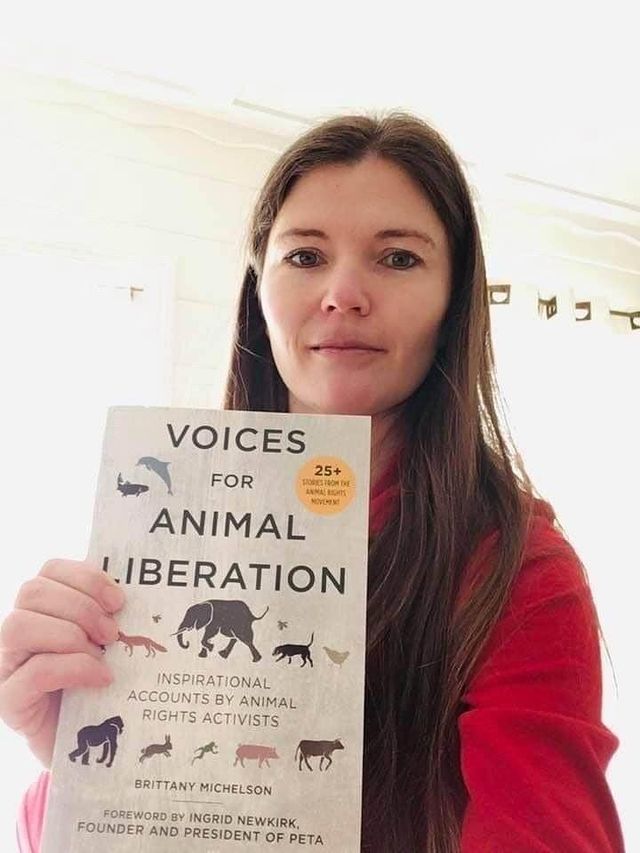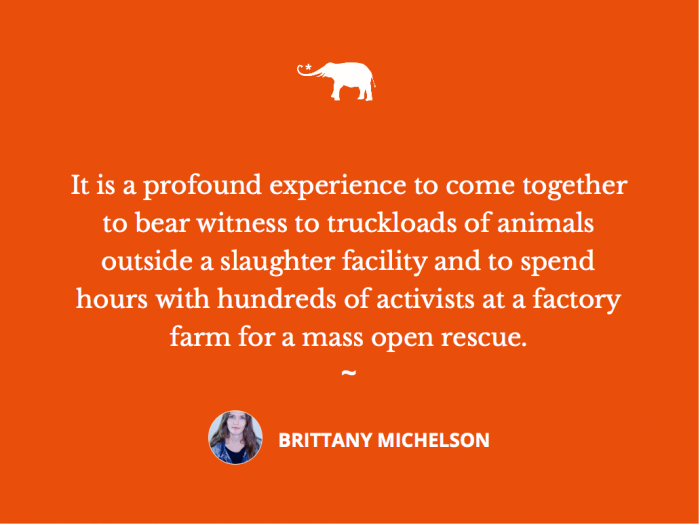
The following is an excerpt from Brittany Michelson’s book Voices for Animal Liberation: Inspirational Accounts by Animal Rights Activists.
~
Animal cruelty is like the domino effect.
You hear of one form of cruelty and then another and another, forming a line of horrors that seems to collapse into itself. When I started learning about the abusive practices inherent in animal food production, I felt an acute level of anger. I found out that male chicks are ground up alive—tossed into a macerator like trash—because they are of no use to the egg industry.
I learned of an industry practice called thumping, where piglets deemed too sick and weak are slammed headfirst onto concrete to kill them. I thought of cows hooked up to machines so that their milk could be extracted for humans instead of being fed to their babies. I thought of their worn-out bodies being hauled off to slaughter after they had spent several years in a cycle of impregnation and having their babies taken away. I thought about the male calves, kept in crates so small they couldn’t turn around, being tenderized for veal.
Thinking about the confinement, mutilation, and abuse of these animals caused me anxiety.
I lost sleep at night; images of animal suffering flashed in my mind. I was overwhelmed, to say the least. How could I live in a world where this kind of sickening abuse happens to the most innocent and vulnerable beings simply because they aren’t able to speak out and defend themselves?
Dogs are widely considered to be beloved companions, yet in some Asian countries, they are slaughtered for the dog meat trade. While cows are sacred in India, they are one of the most popular “food staples” in America. Growing up I never would have accepted the idea of eating dog meat, and had I known back then that such a thing existed, I would have been outraged and disgusted. Yet I ate hamburgers without thinking of the cows who had been killed. We have been conditioned to reject the abuse of certain animals, yet ignore the abuse of animals used for food, clothing, and testing. We are taught contradictions at a young age and have also been taught how to compartmentalize.
In becoming vegan, I realized that something known as cognitive dissonance had been responsible for the rift between my values and my actions. Cognitive dissonance is the state of having inconsistent thoughts, beliefs, or attitudes, especially as relating to behavioral decisions. Although I had always considered myself to be someone who loved and respected animals, I had been passively accepting their torture and misery by eating and wearing animal products. I also learned the concept of speciesism, which is rooted in the assumption of human superiority leading to the exploitation of animals.
Though animals are similar to us in the ways that truly matter—such as the capacity to experience pain, fear, joy, and emotional connection—they have been deemed inferior and thereby have no real rights as citizens of the earth.
Albert Einstein said, “Our task must be to free ourselves by widening our circle of compassion to embrace all living creatures and the whole of nature and its beauty.”
Our ability to achieve planetary peace depends on our ability to stop the mentality of separation based on form, and instead honor our interconnectedness by embracing all beings. If we hope to evolve into a society of justice, it is crucial that we value everyone, including nonhuman animals, as deserving of rights and autonomy.
Becoming vegan was one of the best decisions I’ve ever made for two significant reasons.
It was from that moment that I started living in true alignment with my values—as I am against animal abuse, against the destruction of the environment, and against damaging human health. Veganism also resonates with me on a spiritual level—the idea of non-harm to fellow beings—and I realized that, energetically, I didn’t want to consume torture. As someone who values feminism, I realized that I could not accept the exploitation of female bodies, regardless of species.
Second, becoming vegan led me to animal rights activism, which has gifted me with a focus and motivation that is greater than myself. It has inspired me to be of service to suffering beings and the planet while bringing human connections into my life that are based on fundamental values.
It is a challenge being vegan in a world that values convenience, tradition, and palate pleasure over sentient lives—but when I feel overwhelmed by the cruelty and frustrated with the societal conditioning that permits animal exploitation, I focus on the amazing community of animal rights activists that I am a part of. While society at large views “food” and “clothing” animals as products, we view them not as unknowns in the industry’s machine, but as individuals worth fighting for with the privilege of our human voice.
I have participated in all kinds of disruptions, demonstrations, protests, marches, and vigils, and I have connected with people from diverse walks of life. Some have been vegan for many years and some have recently turned vegan. Many of us feel that it is our obligation to stand up for animals by engaging in activism, to make up for the years that we were complicit in their suffering.
People who are not involved in the movement often refer to animal rights activism as a passion, but in a world where innocent animals are horrifically exploited by humanity, taking action for them is a moral imperative.
As a part of the animal rights community, I feel a sense of belonging that surpasses any sense of belonging I previously felt. Regardless of age, background, experience, or any other categorical factor, there is an instant bond with fellow activists, a bond between those who believe that animals’ lives are more important than taste, habit, convenience, or tradition.
It is a profound experience to come together to bear witness to truckloads of animals outside a slaughter facility and to spend hours with hundreds of activists at a factory farm for a mass open rescue. While some might wonder what the point is of giving water to pigs about to die, or singing songs of liberation to chickens trapped in buildings, we know that every individual deserves to be honored and that their stories must be told.
I am dedicated to bringing justice to the victims of speciesism and planting seeds in the minds of people who have been conditioned by society (as we all have) to passively accept and fund the abhorrent treatment of sentient beings by industries that view them as dollar signs.
Within my activism, I have discovered the power in my voice as I speak truth to the public through a megaphone at nonviolent protests and disruptions. I feel empowered in speaking up for silenced victims by attending actions, and also in the form of writing. I have written a number of awareness-raising articles on animal issues, which is more gratifying than any material I had previously written.
Living in alignment with my values and being committed to work that inspires and fulfills me has also helped alleviate anxiety. My struggles pale in comparison to the nightmare that so many animals are constantly subjected to. Furthermore, while animal cruelty continues to upset me, it doesn’t provoke the level of anxiety that it used to because I know that I am actively part of the solution.
I live for the day when animal exploitation ceases to exist and when nonhumans are valued and respected for the individuals they are. Until that day, I will continue to take action.
~
Check out the book here and here.











Read 3 comments and reply